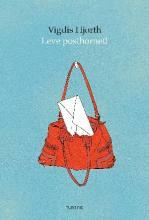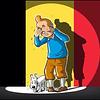Take a photo of a barcode or cover
reflective
slow-paced
Plot or Character Driven:
Character
Strong character development:
No
Loveable characters:
No
Diverse cast of characters:
No
Flaws of characters a main focus:
Complicated
Graphic: Mental illness, Suicide
Minor: Miscarriage, Racism, Xenophobia
funny
hopeful
lighthearted
reflective
sad
fast-paced
Plot or Character Driven:
A mix
Strong character development:
Complicated
Loveable characters:
Yes
Diverse cast of characters:
No
Flaws of characters a main focus:
Yes
I didn't expect to be shaken from complacency by a fictionalized account of the opposition to the third Norwegian postal directive but here we are
This is a beautiful book. Yes the subject matter provides reviewers with countless opportunities for the droll headline (The Best Post Office Novel You Will Read Before the Election - NYT). But don't let those confuse you into thinking that the book's appeal is superficial.
Ellinor, the protagonist, is a sympathetic character. But the steady pace of her life has become banal. Nothing touches her or moves her, not her partner, not the significant experiences of her family. She is shaken from this through a contract to work on an EU postal directive for the Norwegian Postal Workers Union. And through understanding her client, the potential impact on their members she experiences how the mundane can have meaning, the value of connections.
We experience her emotions, her self doubt, how uncomfortable it is to be challenged, even when not satisfied with the current situation. And Hjorth's prose is so beautiful, sparse and meditative, leading the reader to reflect on what matters and is important.
Not that I'm saying that this is a perfect novel. But it's a great one. Highly recommended.
Ellinor, the protagonist, is a sympathetic character. But the steady pace of her life has become banal. Nothing touches her or moves her, not her partner, not the significant experiences of her family. She is shaken from this through a contract to work on an EU postal directive for the Norwegian Postal Workers Union. And through understanding her client, the potential impact on their members she experiences how the mundane can have meaning, the value of connections.
We experience her emotions, her self doubt, how uncomfortable it is to be challenged, even when not satisfied with the current situation. And Hjorth's prose is so beautiful, sparse and meditative, leading the reader to reflect on what matters and is important.
Not that I'm saying that this is a perfect novel. But it's a great one. Highly recommended.
It effectively showed the blunt and vapid existence that many corporate jobs people slide into by being agonising for the first four fifths. I know this was the intent, and being unenjoyable isn’t a failing, it can be enjoyable to not enjoy a book, but I didn’t enjoy not enjoying this.
living in Norway must be really boring
for books about class struggle unionism I suggest reading Germinal or Oil! instead.
This book was so close to being good but the prose was stilted and the entire plot was an afterthought. There was no exploration of Dag's death save for a small discovery of a secret USB port - which lead next to nowhere. There was no further exploration of the letter to Helga save for her impacting a student decades later. There was no exploration of the union as it was - and Ellinor's detachment from the workers or from homeless people is never really up for consideration. She never really deals with these contradictions nor does she explore the political context for WHY these contradictions exist for her in the first place. The disappointment I feel about this book is that it doesn't even make bold statements about the directive or capitalism or the EU. It would be much more compelling if Dag's legacy was his radical politics and his coworkers must confront their political naivety through his work against the directive. The author HINTS as his politics in the text but it never amounts to anything. There are a lot of half measures here. I really wanted to like this one.
for books about class struggle unionism I suggest reading Germinal or Oil! instead.
This book was so close to being good but the prose was stilted and the entire plot was an afterthought. There was no exploration of Dag's death save for a small discovery of a secret USB port - which lead next to nowhere. There was no further exploration of the letter to Helga save for her impacting a student decades later. There was no exploration of the union as it was - and Ellinor's detachment from the workers or from homeless people is never really up for consideration. She never really deals with these contradictions nor does she explore the political context for WHY these contradictions exist for her in the first place. The disappointment I feel about this book is that it doesn't even make bold statements about the directive or capitalism or the EU. It would be much more compelling if Dag's legacy was his radical politics and his coworkers must confront their political naivety through his work against the directive. The author HINTS as his politics in the text but it never amounts to anything. There are a lot of half measures here. I really wanted to like this one.
emotional
hopeful
informative
reflective
medium-paced
Plot or Character Driven:
A mix
Strong character development:
Yes
Loveable characters:
Complicated
Diverse cast of characters:
No
Flaws of characters a main focus:
Yes
challenging
funny
informative
reflective
slow-paced
Plot or Character Driven:
Plot
Strong character development:
Yes
Loveable characters:
No
Diverse cast of characters:
No
Flaws of characters a main focus:
Yes
Galiba seçim zamanı olduğu için beni strese soktu bu kitap...
Well this book just so happens to be perfect too. Give me a depressed anxious apathetic narrator in winter, along with quite the comprehensive existential crisis and I will become very invested in the Norwegian postal service's response to an EU postal directive. A person in an entirely offhand way once told me I was the loneliest person they'd ever met, I hadn't at that point realised this to be true. Alarmingly I very much identify with the narrator of this novel. Who might be the loneliest character I've ever met. Also, does everyone have this internal monologue/argument/battle to reason your way to not panicking about tomorrow, a constant stream of thoughts about inadequacy and self doubt and a what on earth am I doing? I'm always looking for books that explain something I can't make sense of, or to reassure me of a notion that my Frida touches on - "I used to think I was the strangest person in the world but then I thought there are so many people in the world, there must be someone just like me who feels bizarre and flawed in the same ways I do. I would imagine her, and imagine that she must be out there thinking of me too.
Well, I hope that if you are out there and read this and know that, yes, it's true I'm here, and I'm just as strange as you."
Vigdis Hjorth has very much managed that with this novel, one of those magic books that now means an awful lot to me. Also. It's actually quite a hopeful, optimistic book. But it had me much before that corner was turned. 5/5. (And it's the good sort of funny. Actually perfect)
Well, I hope that if you are out there and read this and know that, yes, it's true I'm here, and I'm just as strange as you."
Vigdis Hjorth has very much managed that with this novel, one of those magic books that now means an awful lot to me. Also. It's actually quite a hopeful, optimistic book. But it had me much before that corner was turned. 5/5. (And it's the good sort of funny. Actually perfect)





